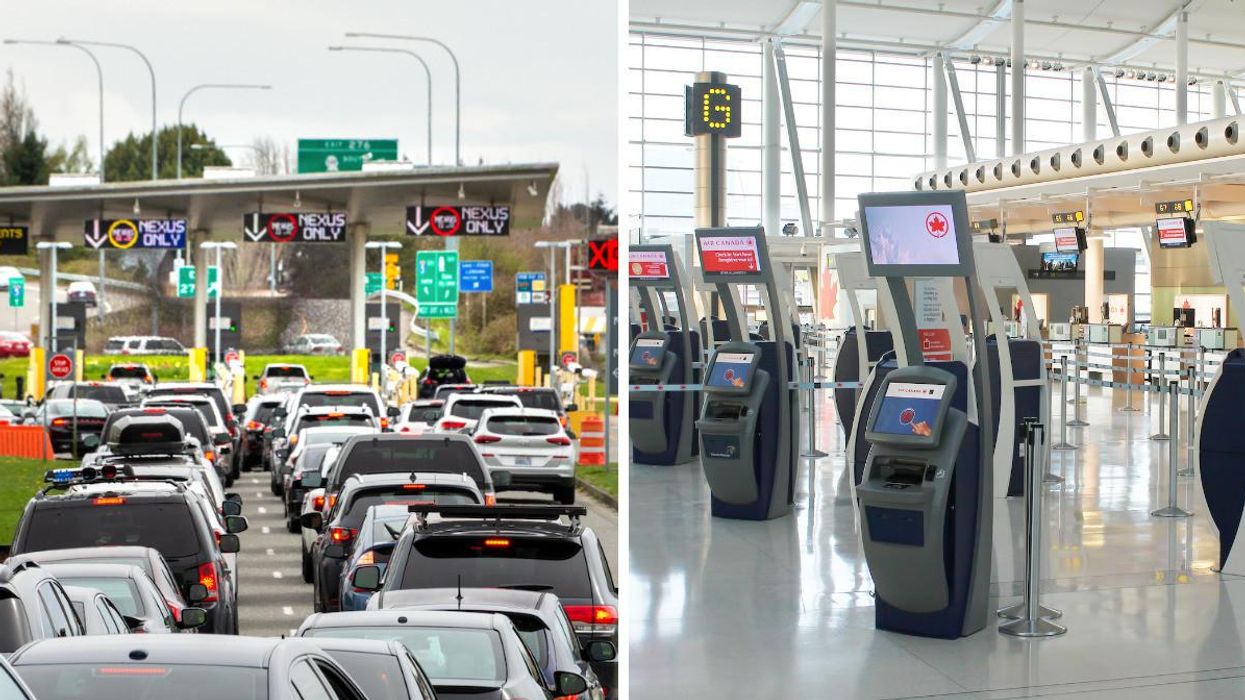Canada's Travel Restrictions Have Just Changed & The Update Will Affect Almost Everyone
It's time, Canada! 👇✈️
Are you ready, travellers? Canada's travel restrictions have had a series of significant updates and this time, the changes will impact almost everyone.
As of Tuesday, November 30, the way we travel inside Canada, and internationally, has changed.
This is because the COVID-19 federal vaccine mandate for travel on federally-regulated trains and planes has kicked in, and applies to most Canadians, permanent residents, international visitors and more.
While there will be some exemptions, Prime Minister Justin Trudeau has made it clear that they will be "exceedingly narrow," which means it's about to get a lot harder for unvaccinated and partially vaccinated people to travel.
This isn't the only change as of November 30, either. The COVID-19 vaccines Canada will accept have been expanded and requirements for those taking short trips abroad have been revised, too.
Here's everything you need to know about what has changed and how you can make sure you're ready.
Canada's vaccine passport
From November 30, 2021, almost all travellers who have not received the full course of a Health Canada-approved COVID-19 vaccine will not be able to board a flight in Canada.
This applies to people aged 12 and older on domestic and international flights, as well as rail passengers on VIA Rail and Rocky Mountaineer trains.
Those who are considered partially vaccinated will not be allowed to board.
To travel, fully vaccinated individuals must show proof of vaccination, like the Canadian COVID-19 proof of vaccination, which is now available in all provinces and territories.
"Airlines and railways will continue to be responsible for confirming the vaccination status of travellers," according to officials.
A negative COVID-19 test is no longer be accepted as an alternative to full vaccination, apart from in instances where the traveller has a valid exemption.
What exemptions are there?
Although Trudeau has made it clear that exemptions will be limited, there are a few.
This includes those with a "medical inability to be vaccinated," individuals with "sincere religious beliefs," those travelling for emergency purposes and those travelling in the national interest.
In most cases, eligibility for exceptions will be determined by individual airlines and railways. Travellers hoping to be considered exempt should contact the specific airline or railway company to submit their request.
COVID-19 vaccines
Canada has also expanded its list of accepted COVID-19 vaccines to include those manufactured by Sinopharm, Sinovac and COVAXIN.
The feds say this will help to align with the World Health Organization Emergency Use Listing.
It means travellers from other countries who have received these vaccines will be considered fully vaccinated in Canada, and therefore will be permitted to skip some travel restrictions.
While an approved vaccine can be received in any country, proof of vaccination must be submitted via ArriveCAN in either French or English.
COVID-19 vaccines manufactured by Pfizer-BioNTech, Moderna, AstraZeneca and Janssen (Johnson & Johnson) continue to be accepted.
Pre-entry testing
That's not all. It is now easier and cheaper for fully vaccinated people with the right of entry to Canada to leave the country for short periods of time.
That's because the feds have scrapped pre-entry COVID-19 testing for those taking trips lasting 72 hours or less.
It means eligible travellers who leave and then re-enter Canada within that timeframe don't have to take a PCR test to come back, regardless of whether they're returning via car or plane.
It also means Canadians taking a short trip across the Canada-U.S. land border are able to skip testing altogether, as the United States does not require testing at its land borders.
For now, the rules have not changed for travellers taking trips longer than 72 hours. Those taking longer trips must continue to provide a pre-entry molecular test before returning to Canada. Antigen tests are not accepted.
What else?
After a new COVID-19 variant was detected in South Africa, the federal government introduced new travel restrictions on November 26 for Canadian citizens, permanent residents and foreign nationals travelling from seven countries in southern Africa.
The new measures include an entry ban for some travellers and mandatory quarantine and testing requirements for others.
This article's cover image was used for illustrative purposes only.
Before you get going, check out our Responsible Travel Guide so you can be informed, be safe, be smart, and most of all, be respectful on your adventure.
- It's About To Get Much Harder For Unvaccinated Travellers To Enter ... ›
- Some Canada Travel Restrictions Set To End But Not For Everyone ... ›
- Crossing The Canada-US Border For Shopping & Visiting Family Is ... ›
- Feds Say Fully Vaccinated Travellers Entering Canada Need ‘More Than Just A QR Code’ - Narcity ›
- CBSA Says Hundreds Of People Have Been Caught With Fake Tests & Vaxx Passports At The Borders - Narcity ›
- Canada's Travel Restrictions Are Being Updated Once Again Due To The Omicron Variant - Narcity ›
- Travelling Between Canada & The US Could Get Harder Due To The Omicron Variant - Narcity ›
- Canada's Travel Restrictions Now Officially Include A Warning Against Non-Essential Trips ›
- Canada’s Travel Restrictions Have Been Updated Again & Here’s Everything You Need To Know - Narcity ›
